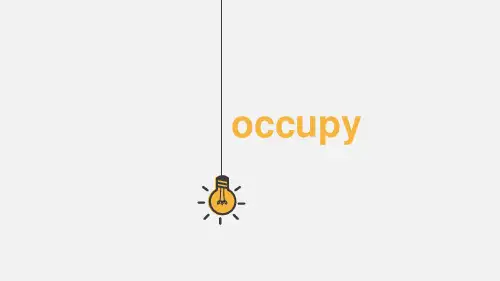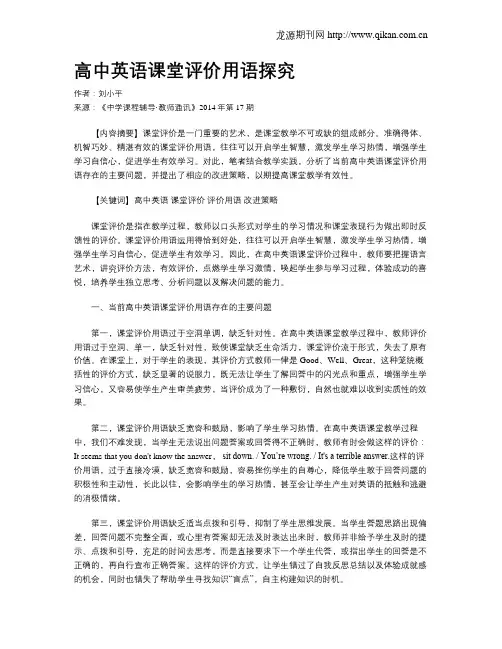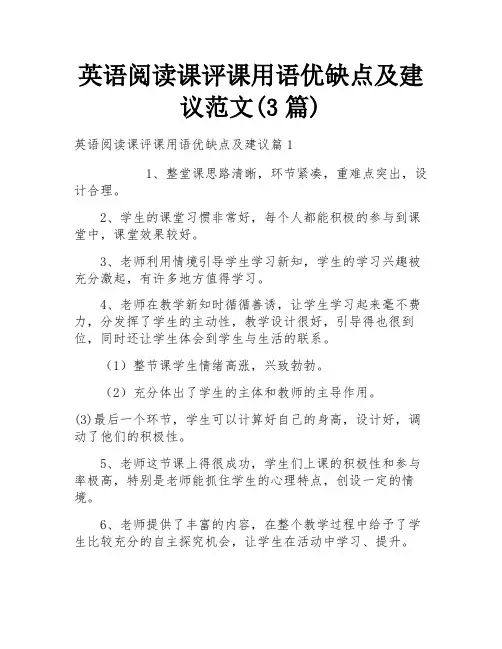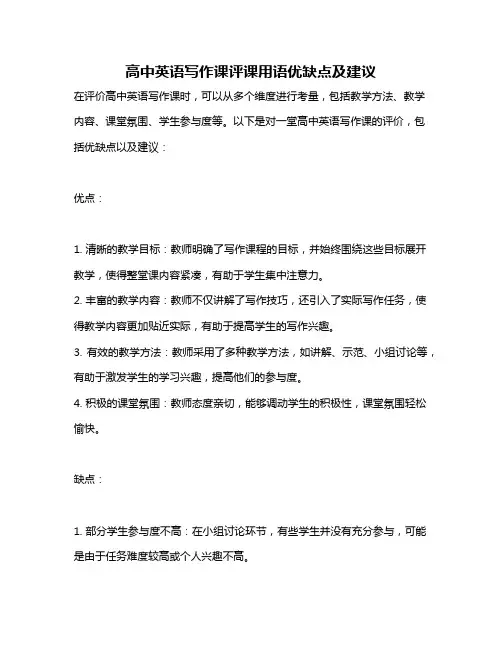高中英语课堂用语
- 格式:doc
- 大小:89.50 KB
- 文档页数:32




高中英语课堂评价用语探究作者:刘小平来源:《中学课程辅导·教师通讯》2014年第17期【内容摘要】课堂评价是一门重要的艺术,是课堂教学不可或缺的组成部分。
准确得体、机智巧妙、精湛有效的课堂评价用语,往往可以开启学生智慧,激发学生学习热情,增强学生学习自信心,促进学生有效学习。
对此,笔者结合教学实践,分析了当前高中英语课堂评价用语存在的主要问题,并提出了相应的改进策略,以期提高课堂教学有效性。
【关键词】高中英语课堂评价评价用语改进策略课堂评价是指在教学过程,教师以口头形式对学生的学习情况和课堂表现行为做出即时反馈性的评价。
课堂评价用语运用得恰到好处,往往可以开启学生智慧,激发学生学习热情,增强学生学习自信心,促进学生有效学习。
因此,在高中英语课堂评价过程中,教师要把握语言艺术,讲究评价方法,有效评价,点燃学生学习激情,唤起学生参与学习过程,体验成功的喜悦,培养学生独立思考、分析问题以及解决问题的能力。
一、当前高中英语课堂评价用语存在的主要问题第一,课堂评价用语过于空洞单调,缺乏针对性。
在高中英语课堂教学过程中,教师评价用语过于空洞、单一,缺乏针对性,致使课堂缺乏生命活力,课堂评价流于形式,失去了原有价值。
在课堂上,对于学生的表现,其评价方式教师一律是Good、Well、Great,这种笼统概括性的评价方式,缺乏显著的说服力,既无法让学生了解回答中的闪光点和重点,增强学生学习信心,又容易使学生产生审美疲劳,当评价成为了一种敷衍,自然也就难以收到实质性的效果。
第二,课堂评价用语缺乏宽容和鼓励,影响了学生学习热情。
在高中英语课堂教学过程中,我们不难发现,当学生无法说出问题答案或回答得不正确时,教师有时会做这样的评价:It seems that you don't know the answer,sit down. / You’re wrong. / It's a terrible answer.这样的评价用语,过于直接冷漠,缺乏宽容和鼓励,容易挫伤学生的自尊心,降低学生敢于回答问题的积极性和主动性,长此以往,会影响学生的学习热情,甚至会让学生产生对英语的抵触和逃避的消极情绪。


英语阅读课评课用语优缺点及建议范文(3篇)英语阅读课评课用语优缺点及建议篇11、整堂课思路清晰,环节紧凑,重难点突出,设计合理。
2、学生的课堂习惯非常好,每个人都能积极的参与到课堂中,课堂效果较好。
3、老师利用情境引导学生学习新知,学生的学习兴趣被充分激起,有许多地方值得学习。
4、老师在教学新知时循循善诱,让学生学习起来毫不费力,分发挥了学生的主动性,教学设计很好,引导得也很到位,同时还让学生体会到学生与生活的联系。
(1)整节课学生情绪高涨,兴致勃勃。
(2)充分体出了学生的主体和教师的主导作用。
(3)最后一个环节,学生可以计算好自己的身高,设计好,调动了他们的积极性。
5、老师这节课上得很成功,学生们上课的积极性和参与率极高,特别是老师能抓住学生的心理特点,创设一定的情境。
6、老师提供了丰富的内容,在整个教学过程中给予了学生比较充分的自主探究机会,让学生在活动中学习、提升。
7.教师可以从学生的特点出发,让学生在玩活动的过程中探索和理解新知识。
总的来说,效果确实不错,值得学习。
8、(1)有"创新"和"创意"。
能活用教材,爱想点子。
新课改的理念体现得很突出。
(2)形成了校本特色:把数学生活化,设计好。
9、在教学设计时充分利用认知基础,组织生用讨论的方式比较原来学习的应用题和这节课学习的应用题有哪些地方不同,让学生明白这节课新知识"新"在由一个未知数发展到两个未知数。
10、组织学生讨论,通过学生的相互交流、互相补充,让学生深刻理解其中的道理。
11、要求学生将掌握的方法用于解题实践。
培养学生思维的灵活性、流畅性开发学生智力、培养学生能的同时提高学生解题方法的水平。
12、课堂气氛活跃。
老师善于激发学生的学习欲望。
13、例题、习题搭配合理,能联系学生的生活,尊重学生原有的基础知识。
14、老师以学生熟悉的生活提出问题,激起学生学习数学的兴趣,进一步体会到数学知识与现实生活紧密联系着,数学知识来源于生活,并在生活中得以应用。



高中英语写作课评课用语优缺点及建议在评价高中英语写作课时,可以从多个维度进行考量,包括教学方法、教学内容、课堂氛围、学生参与度等。
以下是对一堂高中英语写作课的评价,包括优缺点以及建议:优点:1. 清晰的教学目标:教师明确了写作课程的目标,并始终围绕这些目标展开教学,使得整堂课内容紧凑,有助于学生集中注意力。
2. 丰富的教学内容:教师不仅讲解了写作技巧,还引入了实际写作任务,使得教学内容更加贴近实际,有助于提高学生的写作兴趣。
3. 有效的教学方法:教师采用了多种教学方法,如讲解、示范、小组讨论等,有助于激发学生的学习兴趣,提高他们的参与度。
4. 积极的课堂氛围:教师态度亲切,能够调动学生的积极性,课堂氛围轻松愉快。
缺点:1. 部分学生参与度不高:在小组讨论环节,有些学生并没有充分参与,可能是由于任务难度较高或个人兴趣不高。
2. 时间管理可以进一步加强:在课程结束时,部分学生未能完成写作任务,如果教师能更好地管理时间,或许可以解决这一问题。
建议:1. 调整任务难度:针对部分学生参与度不高的问题,教师可以考虑调整小组讨论任务的难度,使其更符合学生的实际水平,提高他们的参与度。
2. 加强时间管理:教师可以提前规划好时间分配,确保每个学生都有足够的时间完成写作任务,避免课程结束时部分学生还未完成的情况。
3. 增加反馈和指导:对于学生的写作成果,教师可以给予更多的反馈和指导,帮助他们更好地提高写作水平。
总体而言,这堂高中英语写作课是一堂比较成功的课。
教师教学目标明确,教学内容丰富,教学方法多样,课堂氛围积极。
但也有一些可以改进的地方,如调整任务难度、加强时间管理以及增加反馈和指导等。
通过这些改进措施,可以进一步提高写作课的效率和质量。


高中英语情景交际总结及练习1.回答对方感谢(Thanks)—Thank you!—It’s a pleasure./My pleasure./Don’t mention it./That’s all right./You are welcome. 2.回答对方道歉(Apologies)—Sorry.—Never mind./It doesn’t matter./It’s all right./Forget it./That’s all right.3.回答对方请求—Can I.../Could I.../Would you mind if I...—1)Yes, please./Sure./Certainly./Of course./Please do./Of course, you can./Go ahead, please.—2)I am sorry; it’s not allowed./I’m afraid not./You’d better not./I’d rather you didn’t.4.回答对方提供帮助—Would you like me to help...—1)Yes, please./That’s very kind of you./Thank you. That would be nice./Thank you for your help.—2)No, thanks./Thank you all the same./It’s very kind of you, but I can manage it myself.5.表示同意和不同意—1)Sure./certainly./Exactly./Absolutely./That’s correct./Of course./All right.(好的)/I agree./I can’t agree more./That’s a good idea./Yes, I think so./ That’s exactly what I was thinking./That’s just how I see it.—2)No way./Of course not./I’m afraid I don’t agree./I don’t think so./Well, it depends./Well, I am not sure about it.6.几个常见的短语:1.So do I. “So+助动词+主语”表述前面一种表肯定意义的情况也适合后面的另一个人,意为“某人也一样”。
高中英语时态语态、主谓一致课堂练习一、时态的理解与判定1. I get up at 7:00 every morning.2. The sun rises in the east.3.The first time we’ll send you with an experienced reporter.4.He lived in Beijing when he was young.5. They’re having a meeting now.6.He was preparing his lecture all day yesterday.7. I knew you would agree.8. I have seen the film already.9. She has been a dancer for ten years.10. When the police arrived, the thieves had run away.11. The Chinese have been making paper for two thousand years.二、时态基础练习(一般现在,一般过去,一般将来,过去将来)1. He often ________(have) dinner at home.2. Daniel and Tommy _______(be) in Class One.3. She and I ________(take) a walk together every evening.4. Mike _______(like) cooking.5. Last year, Susan _______(invent) the memory robot.6. Three days ago, I ____ (go) to the town of Ashland.7. Tom _____ (write) a letter to his brother last night.8. He often ________(have) dinner at home.9. Daniel and Tommy _______(be) in Class One.10. She and I ________(take) a walk together every evening.11. Mike _______(like) cooking.12. Last year, Susan _______(invent) the memory robot.13.Three days ago, I ____ (go) to the town of Ashland.14.Tom _____ (write) a letter to his brother last night.15. I _________ (have) an exciting party last weekend.16. My uncle and auntie __________(go)abroad for their honeymoon next year.17. My father ___________ ( buy) a book for me yesterday.18.He said that he______back in five minutes . ( come )19.He______swimming in the river every day in summer. (go)20.It________you are right. ( seem )(现在进行,过去进行)1.Look, the children______ basketball on the playground. ( play )2. My parents _______(watch)TV now.3.He______to the radio when I came in, ( listen )4.I ___________ (have) my breakfast at half past six yesterday morning.5.Mary _____________ (go) over her lessons from six to seven last night. John and Peter _____________(do) the same thing.6.Was your father at home yesterday evening? Yes, he was. He _______ (listen) to the radio.7.She __________ (make) her dress the whole afternoon.8.While we _____________ (wait) for the bus, a girl __________ (run) up to us.9.We __________ (test) the new machine when the electricity __________ (go) off.10. My brother _________________ (make) a kite in his room now.(现在完成、过去完成)1. I _____________ (work) here since I __________ (move) here in 1999.2.I didn’t meet him. He______ when I got there. ( leave )3.I______my bike, so I have to walk to school. ( lose )4.We______good friends since we met at school . (be)5. So far I _______________(make)great progress in English..6.The famous writer _____(write) one new book in the past two year .7.Harry Potter is a very nice film. I_______(see) it twice.8.Miss Green isn't in the office. She _______(go) to the library.9.My parents ______ (live) Shandong for ten years.10.We _________(finish) the work by six yesterday evening.11.--Who will go to the station to meet Lorry?--I will. I _____ (meet) her several times.12.--Do you know Lydia very well?--Yes, She and I _____(make) friends since we were very young.13.When I reached home, my parents already _________(have)_their supper.14. The factory ____ (build)since the February of 1988.34. Miss Gao ______ (teach) in this school for nearly 5 years.时态综合练习1. ---I need some paper .---I______ some for you . ( bring )2.I cant find my pen . Who______it ? ( take )3.He______down and began to read his newspaper. ( sit )4.I______with you if I have time . ( go )5.We will go to the cinema if it______fine . (be )6.I will tell her the news when she______to see me next week. (come)7.We ______(know) Xiao Li since she was a little girl .8.His uncle (work) in the company for more than 9 years.9.The job proved to be much more difficult than I______(expect).10. The Smiths _______(live) in China for 8 years.11.When Jack arrived he learned Mary ______(leave)for almost an hour.12. It ________(rain) hard when I left my house.13.The bus had gone when I___________(arrive) at the bus stop.14.The team ___________(complete) the railway in three years.15. Don’t talk so loudly. Your father ________(sleep) .16. He ______ (study) English for five years before he came here.17. Our team ________(win) every match so far this year, but we still have three games to play.。
实用标准文案 精彩文档 高中英语课堂用语(较全)一、 打招呼(Greetings) Good morning, class. Good afternoon, class 4. Good morning, everybody. Good afternoon, everyone. Good morning, boys and girls. Good afternoon, children. How are you all today? Are you all well this morning? 打招呼之后,可以增加一两句(Beginning a chat) Well, did you have a good weekend? Well, did you enjoy the holiday? Well, what did you do yesterday evening? Tell me what you did at the weekend? 谈谈学生衣着发型也可以: Oh, you\'ve got a new dress on. It\'s very nice. Oh, you\'ve got a new hair style. 二、考勤(Checking attendance) 1.点名 Right ! I\'m going to call the row. OK ! Listen while I call your names. Now ! I\'ll take the register. Quiet f now, please. Listen while I see if you\'re all here. 2.问缺席情况 Now ! Let\'s see who\'s absent. 实用标准文案 精彩文档 Right ! Let\'s see if anyone\'s away. Is anybody absent? Is everybody here? 3. 关照新生 Oh, are you new? OK, are you a pupil? You have just come to this class (school), haven\'t you? Where do you come from? What\'s your name? Do you like the school? Welcome to our class. 4. 谈缺勤原因 Where\'s Wang Hai? Does anyone know where Li is? Can anyone tell me where Liu has gone? Who knows when he will be back? Han Meimei is ill today, isn\'t she? 5. 关照病愈者 You were absent for three lessons last week. Did you catch a cold? Oh, I\'m sorry. You\'ll catch up l won\'t you? 实用标准文案 精彩文档 Don\'t worry. You\'ve been absent for days, haven\'t you? You were away last lesson, weren\'t you? \' What was the matter? Why were you away? Are you better? How are you feeling now? Do you feel better? Well, Jane, ask your friends to help you. OK, you\'d better ask your neighbour to tell you what we\'ve done. Come and see me after the lesson, OK? 三.介绍 Now, let me introduce myself. I\'ll just tell you a bit about myself. My name is..., spelt... I\'ve been teaching in the school for 1O years. I come from Shanghai. I worked for a newspaper until last year. And what about you? Will you introduce yourselves? 四.开始谈话 实用标准文案 精彩文档 T: I went to the Summer Palace (引出话题) Yesterday. Did any of you go? No?... Well, (无人回答,问某一学生) What did you do, -.. er... Zhang Hong. Zhang:... er... I-. - er. -. in home. (学生响应断断续续) T: Oh, you stayed at home. (“搭救“说话的学生 ) Zhang: Yes, I stay at home. T: OK, you stayed at home. (暗中纠正时态) What did you do then? Zhang:... TV... T: Oh, you watched television 9 didn\'t you? Which programme? (继续问下去困难,可就此打住 ) 有关用语还有: Tell me what you did 1ast night. Will you te11 me a bit about your weekend? Could you tell us more about the programme? How did you like yesterday\'s party? 五.建议 (Suggesting) Let\'s go through the text. Could you open your textbook and find Ex. 5 on page 45? Could you take out the cards? Will you all think of some questions to ask each other? 实用标准文案 精彩文档 Will you get together in groups and discuss the idea? Try to think it out for yourself. Let\'s work out how you could plan your piece of writing. Now you\'ve answered all the questions in full. You need to say a bit more about that. You\'d better get that right. 六.提起注意 (Directing students\' attention) Quiet, now, please. Let\'s work in pairs. Will you face the people in front of you? Fine. Look again carefully. Are you ready to listen? Are you all listening? OK, then. Now then something new! Let\'s change the topic. That was quite good, let\'s do it once more. 七.请求(Making polite requests) Could you possibly plug the cassette player in for me? Can you check thetch is on? Will you go and fetch some chalk? Will you find the wall charts? Has anybody seen the stick/tape/drawing pins? Please could you put it up here? 实用标准文案 精彩文档 Please would you mind cleaning the board? 八.指导 (Giving instructions) 1. 纠正语音 You\'d better listen again. Will you listen carefully? Now listen to the sound [a:].Not [a ], like this - you try. Don\'t forget it\'s [[] not [a ] in and. Now listen. There\'s something different, What\'s different? Listen. 2. 启发思路 Suppose a friend needs advice on the subject- You could agree with the other person and say something else. You may ask the reason. Shal1 1 demonstrate? Keep to the same pattern, ~ OK? What do you think the author will say next? I\'ll give you a cue. It\'s something to do with -. Let me give you some help. When did the man use the word? 3. 介绍方法 You\'d better put them together- Ask each other questions to find out what is different. Look at the sentence before and see if you can guess. You sort out these sentences, then copy them, taking care with